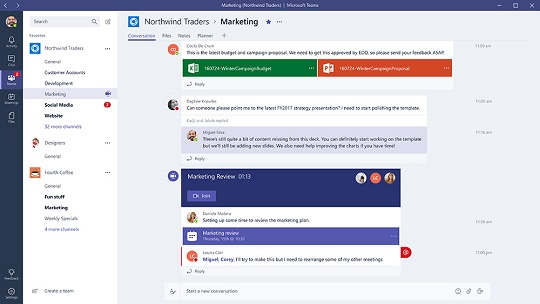New age of business communications: Slack, Yammer and Microsoft Teams

Team communications for Microsoft Dynamics (and other enterprise systems) used to be synonymous with group email. Or maybe, if your team leader was particularly tech savvy, an IM session on something like AIM or Skype.
Those simpler days, however, are gone. Team communication today is often best done using more expansive workspace messaging channels. Slack and Yammer, for instance, allow for open and closed groups, private sub-communities (Slack "channels" and Yammer "groups"), video and audio streams, and API integration with third-party products.
However, since Microsoft announced its Teams platform last month - widely touted as a Slack competitor - the game has shifted. Workplaces that run Dynamics want to know: Should we fall back on Yammer, set up a Slack account, wait for Teams' public launch early in 2017, or maybe some combination of all of the above?
According to Trevor Molag, marketing specialist at the Vancouver-based Encore Business Solutions, the answer could depend on whether a workplace already has Slack set up. (He also wrote about the issue recently.) If so, they'd be well advised to follow the path of least resistance and continue with Slack. Then, once Teams has been launched and established, it may still be worth keeping an eye on the new kid on the block. Depending on the use case, one shouldn't forget Yammer either, which Microsoft has advised will continue to serve users with its strengths in social networking in a professional context rather than team collaboration.
"Yammer is ...
FREE Membership Required to View Full Content:
Joining MSDynamicsWorld.com gives you free, unlimited access to news, analysis, white papers, case studies, product brochures, and more. You can also receive periodic email newsletters with the latest relevant articles and content updates.
Learn more about us here